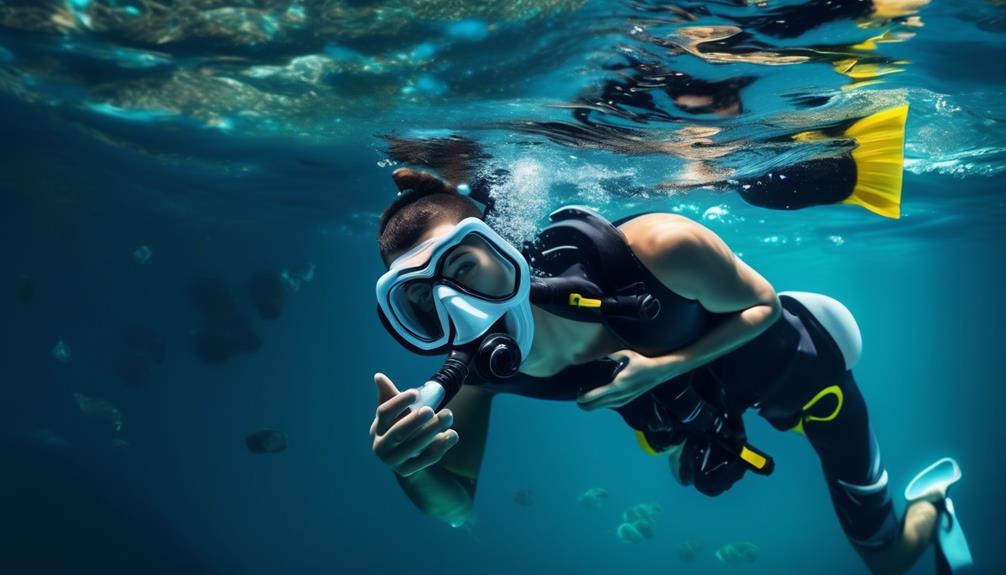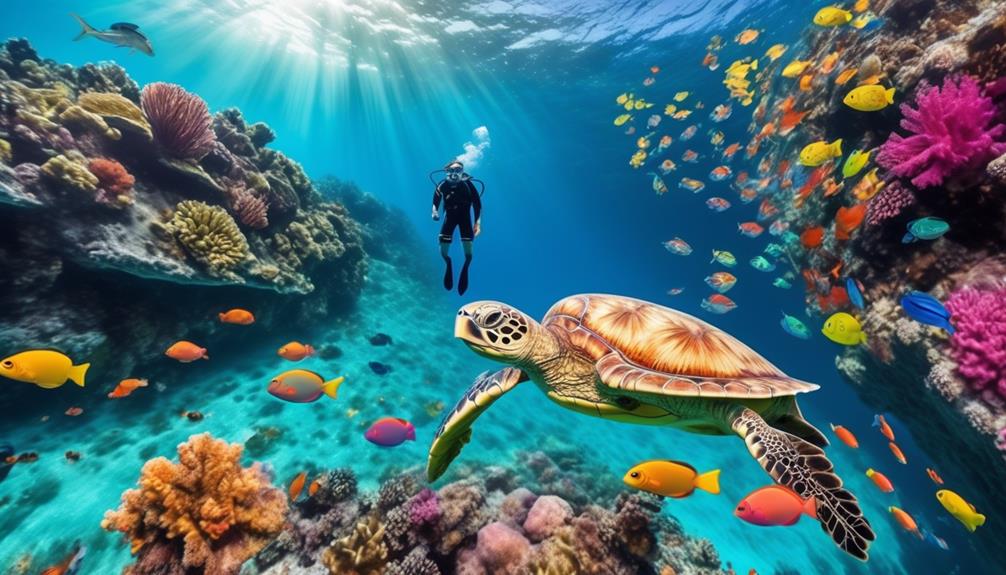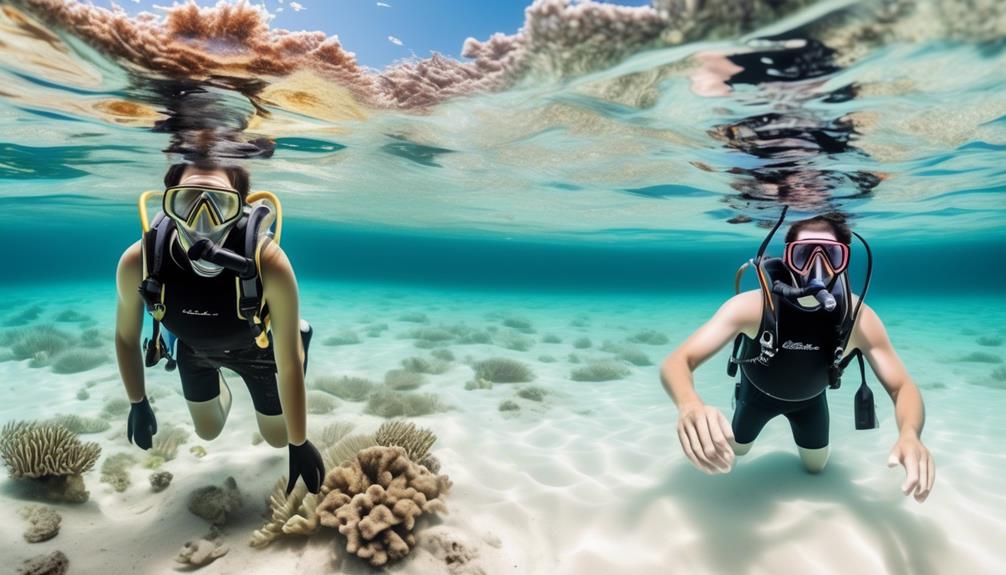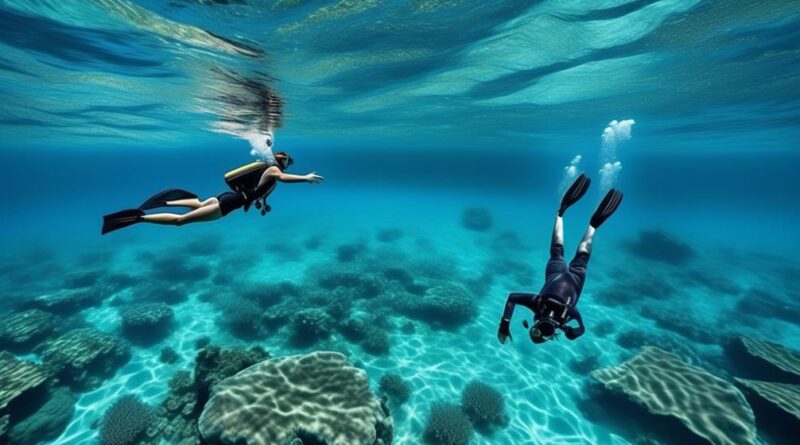What's Easier for Beginners: Scuba Diving or Snorkeling?
Deciding between scuba diving and snorkeling as a beginner can be a daunting task. Both activities offer unique experiences and opportunities to explore the underwater world, but each comes with its own set of challenges and rewards.
From the gear and equipment required to the training and certification process, there are several factors to consider before taking the plunge.
So, which one is truly easier for beginners? Let's dive into the specifics and weigh the pros and cons to help you make an informed decision.
Gear and Equipment
When starting scuba diving or snorkeling, it's essential to have the right gear and equipment to ensure a safe and enjoyable experience underwater. Gear selection is crucial, and it's important to choose equipment that fits properly and is well-maintained. For scuba diving, the basic gear includes a mask, snorkel, fins, buoyancy control device (BCD), regulator, dive computer, wetsuit, and weights. It's essential to ensure that the gear fits comfortably and is in good working condition. Regular maintenance of diving equipment is vital to ensure its reliability and safety.
If you're just starting out, renting equipment is a practical option. Many diving centers and resorts offer equipment rental, allowing you to try different gear before making a purchase. This is particularly useful for beginners who are still figuring out their preferences. However, if you find yourself diving or snorkeling frequently, purchasing your own gear may be more cost-effective in the long run. When purchasing equipment, it's crucial to invest in high-quality gear that meets safety standards. Properly fitting gear not only enhances your comfort but also contributes to your safety and overall enjoyment while underwater.
Remember to inspect your gear regularly, including the condition of masks, snorkels, and fins. Additionally, having your own equipment enables you to familiarize yourself with it, promoting a sense of confidence and control during your underwater adventures. Whether renting or buying, the right gear and equipment are fundamental to a successful and enjoyable diving or snorkeling experience.
Training and Certification
Considering pursuing scuba diving or snorkeling? Wondering about the essential training and certification needed to get started? Let's delve into the certification process and training programs for both activities.
Scuba diving requires comprehensive training and certification due to the inherent risks associated with breathing underwater and managing dive equipment. The first step is to enroll in a scuba diving certification course, such as those offered by renowned organizations like PADI or NAUI. These courses typically consist of classroom sessions, confined water training, and open water dives under the supervision of a certified instructor. Upon successful completion of the training program, you'll be awarded a scuba diving certification that allows you to dive within the limits of your training.
On the other hand, snorkeling doesn't necessitate formal certification. While there are no specific training programs required for snorkeling, it's still essential to be familiar with basic water safety and snorkeling techniques. Many resorts and tour operators offer brief instructional sessions for beginners, covering topics such as proper use of snorkeling equipment, safety guidelines, and effective swimming techniques.
Breathing Techniques

As you advance from mastering the training and certification process, understanding proper breathing techniques becomes crucial for both scuba diving and snorkeling. Whether you're exploring the depths of the ocean or leisurely swimming near the surface, mastering the art of breathing will enhance your overall experience.
Here are some essential breathing techniques to consider:
- Buoyancy Control: When scuba diving, proper breathing control is vital for managing your buoyancy. Inhaling deeply can cause you to ascend, while exhaling fully can lead to descent. By mastering your breathing rhythm, you can effectively control your depth during a dive, ensuring a safe and enjoyable experience.
- Equalization: Equalizing your ears and sinuses is crucial when descending underwater. Whether you're snorkeling or scuba diving, learning how to equalize the pressure in your ears is essential for preventing discomfort and potential injury. Practice various equalization techniques to find the method that works best for you.
- Surface Breathing and Free Diving: For snorkelers, mastering efficient surface breathing techniques is key to maximizing your time underwater. Additionally, if you're interested in free diving, proper breathing exercises are essential for increasing breath-holding capacity and overall diving performance.
Depth and Water Pressure
To understand the impact of depth and water pressure on your diving experience, it's essential to grasp the fundamental principles of these factors. As you descend underwater, the pressure increases, affecting your body and equipment. One crucial aspect to manage is equalizing ears. As you go deeper, the surrounding water pressure increases, causing discomfort in your ears. To counter this, you need to equalize the pressure inside your ears with that of the surrounding water by gently pinching your nostrils and blowing through your nose. Mastering this technique is vital for a comfortable and safe dive.
Buoyancy control is another critical factor affected by depth and water pressure. As you descend, your body becomes more compressed due to the increased pressure, and this affects your buoyancy. You'll need to adjust the air in your buoyancy control device (BCD) to maintain a steady and controlled descent. Failing to do so can result in sinking too quickly or struggling to stay afloat, both of which can be dangerous. Proper buoyancy control not only ensures your safety but also conserves energy and air, allowing for a more enjoyable and prolonged dive.
Understanding how depth and water pressure impact your body and equipment is crucial for a successful diving experience. Mastering techniques such as equalizing ears and buoyancy control will enable you to navigate the underwater environment with confidence and ease.
Wildlife Encounter

Mastering the techniques for equalizing ears and buoyancy control will enhance your chances of a captivating wildlife encounter while scuba diving or snorkeling. Both activities offer unique opportunities to witness the wonders of the underwater world. Whether you're exploring vibrant coral reefs or observing fascinating marine life and sea creatures, each experience presents its own set of advantages.
- Underwater Photography: While snorkeling, you can easily capture stunning images using a waterproof camera or a quality smartphone case. The natural light and close proximity to the water's surface often result in vibrant and colorful photographs. On the other hand, scuba diving allows for more intricate and detailed shots due to the ability to dive deeper and stay submerged for longer periods, providing opportunities for capturing elusive marine creatures in their natural habitat.
- Coral Reefs: Snorkeling offers an up-close view of the intricate and diverse ecosystems of coral reefs. The shallow depth allows you to observe the vibrant colors and intricate formations of the corals, as well as the various fish and invertebrates that call these reefs home. Scuba diving, with its ability to explore deeper sections of the reef, provides a more comprehensive understanding of these vital ecosystems and the complex interactions between different species.
- Marine Life and Sea Creatures: Snorkeling allows for effortless observation of marine life near the water's surface. It provides an opportunity to witness larger marine animals such as sea turtles and rays, as well as smaller colorful fish, without the need for specialized equipment. Conversely, scuba diving allows for encounters with a wider range of sea creatures, including larger and more elusive species that dwell at greater depths, offering a more immersive and diverse wildlife experience.
Physical Exertion
Improving your physical fitness can significantly enhance your enjoyment and endurance during both scuba diving and snorkeling excursions. When it comes to stamina levels, snorkeling generally requires less physical exertion compared to scuba diving. Snorkeling allows you to float on the water's surface, conserving energy as you observe the underwater world. However, having good stamina levels is still important, especially when dealing with currents or swimming longer distances.
On the other hand, scuba diving demands a higher level of physical exertion. Carrying scuba gear, such as the tank and regulator, can be physically taxing, especially when moving from the boat into the water. Additionally, swimming against currents or descending to greater depths requires good muscle strength and endurance. Proper buoyancy control and finning techniques are essential for conserving energy and maximizing your dive time.
In terms of muscle strength, both scuba diving and snorkeling engage various muscle groups. Snorkeling mainly targets the leg muscles for swimming and the core muscles for stability in the water. Meanwhile, scuba diving involves more muscle groups, including the legs, arms, and core, as you maneuver through the water and manage the equipment.
Regardless of whether you choose to snorkel or scuba dive, maintaining good overall physical fitness, including cardiovascular endurance and muscular strength, will undoubtedly enhance your underwater experience and ensure that you can fully enjoy the wonders beneath the surface.
Cost and Accessibility

Considering the cost and accessibility of both scuba diving and snorkeling, it's important to weigh the financial investment and practical aspects of each activity before making a decision. Both activities offer unique experiences, but there are some key differences to take into account.
- Location options: Snorkeling tends to be more accessible in terms of location options. You can enjoy snorkeling in various places such as beaches, coral reefs, and even in shallow waters. On the other hand, scuba diving often requires specific dive sites, which may not be as readily available in all locations. It's important to consider whether you have easy access to scuba diving sites before committing to the activity.
- Budget considerations: Snorkeling generally requires less financial investment compared to scuba diving. The essential gear for snorkeling, including a mask, snorkel, and fins, is relatively affordable and can be rented in many tourist destinations. In contrast, scuba diving involves the additional cost of certification, specialized equipment like a wetsuit, buoyancy control device, regulator, and dive computer, as well as air tank refills. These expenses can add up, making scuba diving a more significant financial commitment.
When considering the cost and accessibility, it's essential to evaluate your location options and budget considerations. Snorkeling may be more accessible and budget-friendly, making it a suitable choice for beginners who want to explore underwater environments without the extensive investment required for scuba diving.
Safety and Risks
Before embarking on either scuba diving or snorkeling as a beginner, it's crucial to understand the safety considerations and potential risks associated with each activity.
When it comes to scuba diving, it's essential to undergo thorough training to understand emergency procedures and risk assessment. Scuba diving involves diving to significant depths, which increases the risk of decompression sickness and nitrogen narcosis. Proper training and adherence to safety protocols can mitigate these risks. It's important to be aware of potential environmental hazards such as strong currents, marine life encounters, and equipment malfunctions. However, with the implementation of safety measures like pre-dive equipment checks, diving with a buddy, and staying within the limits of your training, these risks can be minimized.
On the other hand, snorkeling is generally considered a safer option for beginners. However, it's still important to be mindful of potential risks. While snorkeling, it's crucial to be aware of environmental hazards such as strong currents, marine life, and water visibility. It's essential to practice safety measures such as staying close to the shore, using a snorkel vest for buoyancy, and being cautious of changing weather conditions.
Frequently Asked Questions
Can I Wear Glasses or Contacts While Scuba Diving or Snorkeling?
You can wear prescription masks for scuba diving or snorkeling. They provide clear underwater vision. Contacts can be worn but should be used with caution due to the risk of losing them in the water.
Are There Any Age Restrictions for Scuba Diving or Snorkeling?
Age restrictions for scuba diving and snorkeling vary by location and organization. Safety guidelines typically require individuals to be at least 10-12 years old for scuba diving and 8 years old for snorkeling. Always check local regulations.
What Should I Do if I Start Feeling Claustrophobic Underwater?
If you start feeling claustrophobic underwater, focus on managing claustrophobia and equalizing pressure. Try relaxation techniques like deep breathing to calm underwater panic. Remember to communicate with your dive buddy and consider seeking professional guidance.
Is It Possible to Snorkel or Scuba Dive if I Have a Fear of Sharks or Other Marine Animals?
If you have a fear of sharks or other marine animals, you can still snorkel or scuba dive. Overcoming fears and ensuring underwater safety through proper training, equipment, and guidance can help ease your concerns.
How Do I Prepare for the Physical Demands of Scuba Diving or Snorkeling?
To prepare for the physical demands of scuba diving or snorkeling, focus on breathing techniques and physical conditioning. Practice deep breathing to increase lung capacity and engage in regular strength and endurance training to build stamina.
Conclusion
In conclusion, for beginners, snorkeling may be easier than scuba diving due to the minimal gear and training required, as well as the shallower depths and lower water pressure.
Snorkeling also allows for wildlife encounters and physical exertion while being more cost-effective and accessible.
However, both activities come with their own safety risks, so it's important to always prioritize safety and receive proper training and certification before diving or snorkeling.
